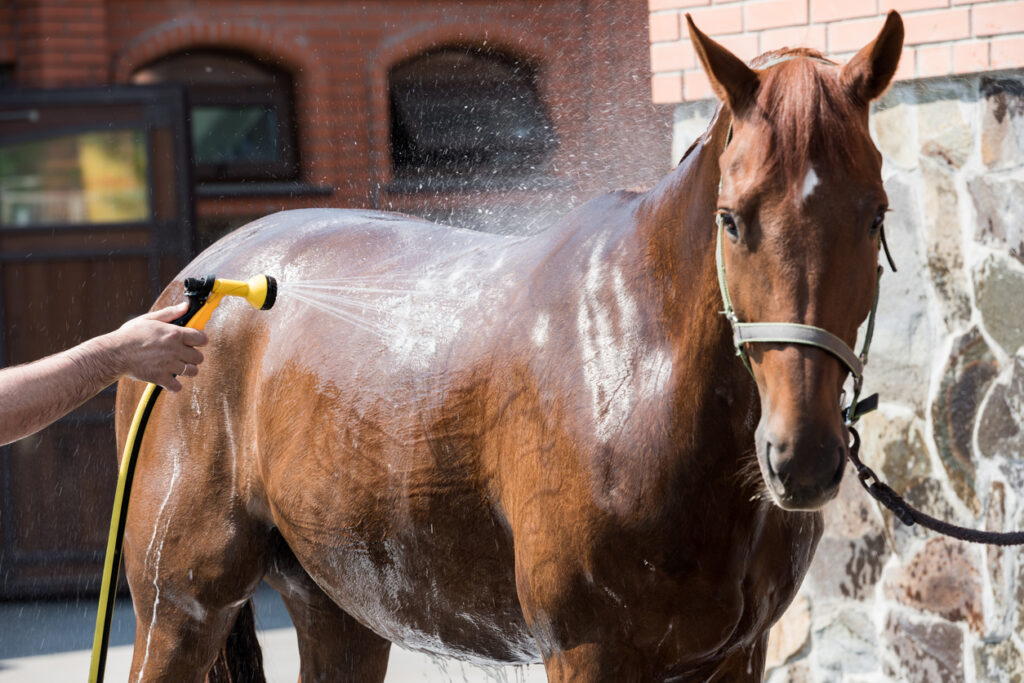When it comes to keeping our beloved equine friends looking their best, many horse owners turn to whitening shampoos as a trusted solution. But, are whitening shampoos safe for horses? This question is crucial for every horse owner or caretaker who wants to ensure both the aesthetic appeal and health of their horse. In this article, we will delve into the world of whitening shampoos, examining their ingredients, benefits, and potential risks.

Understanding Whitening Shampoos for Horses
Whitening shampoos are specially formulated to enhance the brightness and overall appearance of a horse’s coat. They are particularly popular among those who own horses with light-colored coats, such as grays and palominos. These shampoos work by removing stains and enhancing the natural shine of the coat.
Key Ingredients in Whitening Shampoos
Understanding the ingredients in whitening shampoos is essential to determine their safety. Common ingredients include optical brighteners, bluing agents, and mild detergents. Optical brighteners reflect light, making the coat appear brighter, while bluing agents counteract yellowing. Mild detergents help remove dirt and grime without stripping natural oils.
Optical Brighteners
Optical brighteners are chemicals that absorb ultraviolet light and re-emit it as visible blue light, creating a whitening effect. While effective, it’s important to ensure these chemicals are safe for equine skin.
Bluing Agents
Bluing agents are often used to neutralize yellow tones in the coat, restoring a more natural white appearance. Although generally safe, it is crucial to follow the instructions carefully to avoid any potential skin irritation.
Potential Risks of Whitening Shampoos
While many horse owners use whitening shampoos without issues, there are potential risks to be aware of. Some horses may have sensitive skin that reacts to certain ingredients. Additionally, overuse can lead to dryness or irritation.
Skin Sensitivity
Horses with sensitive skin may experience irritation or allergic reactions to certain ingredients in whitening shampoos. It’s advisable to perform a patch test before applying the product to the entire coat.
Dryness and Irritation
Frequent use of whitening shampoos can strip natural oils from the horse’s skin, leading to dryness and irritation. To prevent this, it’s recommended to use these shampoos sparingly and follow up with a moisturizing conditioner.
Benefits of Using Whitening Shampoos
Despite potential risks, there are several benefits to using whitening shampoos for horses. They can significantly enhance the appearance of a horse’s coat, making it look cleaner and more vibrant.
Enhancing Coat Appearance
Whitening shampoos can effectively remove tough stains caused by dirt, grass, or manure, leaving the coat looking fresh and bright.
Boosting Show Performance
For show horses, a bright and clean coat is essential. Whitening shampoos can help achieve the desired look, potentially boosting performance and impressions during competitions.
How to Choose the Right Whitening Shampoo
Choosing the right whitening shampoo is crucial for your horse’s safety and the effectiveness of the product. Here are some tips to consider:
Read Labels Carefully
Always read the labels to understand the ingredients and ensure they are suitable for your horse’s skin type.
Consult a Veterinarian
Consulting a veterinarian can provide valuable insights into the best products for your horse, especially if they have a history of skin sensitivities.
Applying Whitening Shampoo Safely
Proper application is key to avoiding potential issues with whitening shampoos. Begin by thoroughly wetting the horse’s coat and applying a small amount of shampoo. Gently massage it into the coat, avoiding sensitive areas such as the eyes and ears. Rinse thoroughly to ensure no residue is left behind.
Alternatives to Whitening Shampoos
If you’re concerned about the risks associated with whitening shampoos, there are alternatives to consider. Herbal shampoos and natural cleaning solutions can offer a gentler approach to maintaining a clean and bright coat.
Considering Natural Solutions
Natural solutions, such as vinegar or baking soda, can be effective in removing stains and enhancing the coat’s appearance without harsh chemicals.
Maintaining a Healthy Coat
Beyond choosing the right shampoo, maintaining a healthy coat involves regular grooming, proper nutrition, and a clean environment. Fly repellent shampoos can also help keep pests away, further contributing to your horse’s overall well-being.
Personal Stories: Horse Owners Share Their Experiences
Many horse owners have shared their experiences with whitening shampoos. Some report positive results, while others have encountered challenges. Learning from these stories can provide valuable insights into the effectiveness and safety of these products.
Conclusion: Making an Informed Decision
In conclusion, are whitening shampoos safe for horses? The answer largely depends on the individual horse and the specific product used. By understanding the ingredients, potential risks, and proper application methods, horse owners can make informed decisions that ensure the health and well-being of their equine companions.

FAQs
1. Can whitening shampoos cause allergic reactions in horses?
Yes, some horses may have allergic reactions to certain ingredients. It’s important to perform a patch test before full application.
2. How often should I use whitening shampoo on my horse?
It’s recommended to use whitening shampoos sparingly to avoid drying out the coat. Once every few weeks is generally sufficient.
3. Are there natural alternatives to whitening shampoos?
Yes, natural alternatives like vinegar or baking soda can be used to clean and brighten a horse’s coat without harsh chemicals. For more tips, visit Equestrian Reality.
This article contains affiliate links. We may earn a commission at no extra cost to you.
